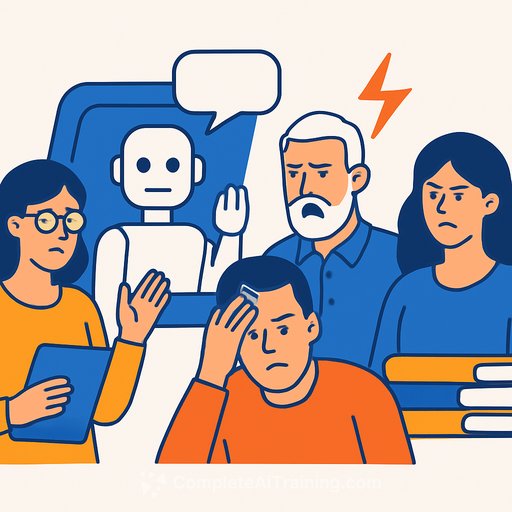AI Books vs Human Books: A Field Guide for Working Writers
A hard question is on the table: will books split into two markets-cheap AI content for most people and pricier human work for a smaller group of readers? More than half of UK novelists surveyed think AI could replace their work. That fear isn't abstract. Models can imitate famous voices in seconds and at zero cost.
Beyond lost income and IP theft, there's a bigger risk: we reduce reading to infinite quantity and no identity. That's not writing. That's content.
What's actually changing
Readers are already fine with AI for some non-fiction. It feels efficient. But the best factual writing isn't just facts-it's selection, framing, and meaning. That's still human work.
Genre gets flagged as vulnerable-romance, crime-because patterns are easy to mimic. Yet the standouts in any shelf survive on surprise, timing, and lived detail. Demand is relentless, though. If you don't ship, a model will.
We're also seeing the public soften to AI in other creative mediums. The initial uproar over AI-made title sequences and synthetic performers has eased in places. Publishing isn't isolated from that drift.
The two-tier risk
There's already a gap. Time to read is a luxury, and many families can't stock books. In England, roughly one in five children don't own a book according to a 2022 study (National Literacy Trust). If human-written work becomes a premium category while AI floods the bottom shelf, access narrows even more.
Researchers warn this would have real social costs. Guardrails are being urged. Writers need to push for them-and build careers that don't rely on platforms alone.
What won't change
Readers still want a human mind on the other end. That doesn't disappear. As one debut novelist put it: keep writing. The only way your voice is crowded out is if you stop.
How writers win in an AI-heavy market
- Make your voice unfakeable. Use specifics a model can't guess: places you've lived, trades you know, subcultures you've actually seen. Quote people you've interviewed. Add sensory detail that comes from showing up, not scraping.
- Ship on a cadence. Treat your work like a studio. For example: weekly newsletter, monthly short, quarterly book. Consistency beats bursts.
- Use AI as an assistant, not as your voice. Brainstorm, outline, and spot gaps with tools, but keep final prose and core ideas human. Maintain a style sheet so your tone stays yours.
- Prove authorship. Share process notes, drafts, and marginalia. Record short "author's note" audios. Signed editions and live reads create artifacts that signal human origin.
- Differentiate with research. Build a source library, keep receipts, and credit experts. Quality beats volume. Readers pay for trust.
- Own your distribution. Build an email list, reader circle, and direct sales page. Platforms change. Your list is insurance.
- Offer a product ladder. Free samples, fairly priced ebooks, premium print, annotations, workshops, and book clubs. Let readers choose their level of support.
- Protect your rights. Register copyrights, read contracts closely, and monitor for scraping or knockoffs. Join author groups and back sensible policy efforts (Authors Guild: AI Advocacy).
- Be clear about tool use. Simple disclosures build trust. Keep a changelog for drafts if you collaborate with editors or software.
- Collaborate across mediums. Pair with illustrators, musicians, or historians. Human networks create work that models struggle to imitate.
A simple weekly rhythm you can start now
- Mon: Research and interviews. Outline two pieces.
- Tue: Draft 1, no editing. Voice first, speed second.
- Wed: Draft 2 with your style sheet. Trim clichés.
- Thu: Fact check and line edit. Add one lived detail per page.
- Fri: Publish and send to your list. Share a short behind-the-scenes note.
- Sat: Reader replies, notes for next week.
- Sun: Rest or read outside your genre.
On volume vs value
Yes, AI can spit out 400 pages overnight. Don't play that game. Play the game of trust, perspective, and taste. It takes longer, but it compounds.
If you want help building ethical, high-output workflows
For tool roundups and practical prompts that support your process (without replacing your voice), see: AI tools for copywriting and prompt practices for writers.
Bottom line: AI will flood the market with passable text. Your edge is lived experience, consistent publishing, and a direct line to readers. Keep writing-and make it unmistakably yours.
Your membership also unlocks:






